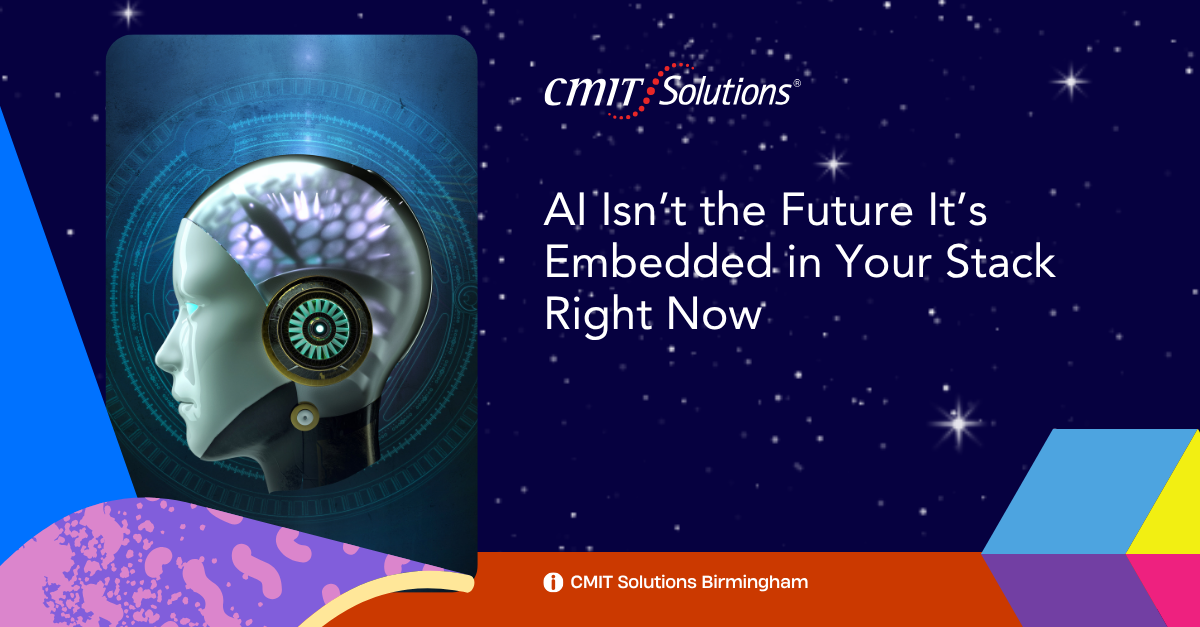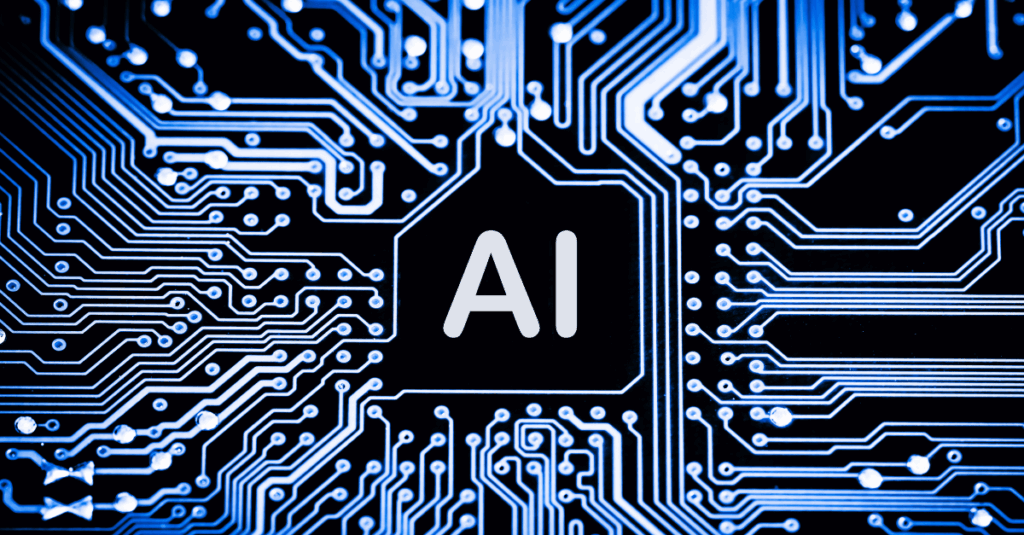Introduction:
For many small and mid-sized businesses in Birmingham, artificial intelligence still feels like a futuristic concept—a buzzword reserved for tech giants or cutting-edge startups. But the truth is far more immediate and impactful: AI is already woven into the digital fabric of your daily operations, whether you realize it or not. From the spam filters in your email to predictive text in your CRM, and from cybersecurity defenses to productivity tools like Microsoft 365 and Google Workspace, AI isn’t coming—it’s already here.
At CMIT Solutions of Birmingham, we believe it’s time to stop asking when your business will use AI and start understanding how it already does. In this blog, we’ll uncover the often-invisible ways AI is integrated into your IT stack, why that matters for your business performance and security, and how you can harness these capabilities to stay ahead in a competitive market.
What Does “Embedded AI” Really Mean?
Embedded AI refers to intelligent capabilities that are natively integrated into software and hardware—not as external tools but as core components. In cloud environments, for example, AI constantly analyzes performance metrics, reallocates resources, and prevents failures before they affect users.
When small businesses pursue a scalable cloud strategy, they’re already leaning on embedded AI to optimize infrastructure. From automated provisioning to intelligent workload distribution, the benefits of AI are delivered without requiring manual oversight—proving that cloud functionality today is fundamentally AI-powered.
Hybrid cloud platforms are enabling Birmingham SMBs to scale confidently and securely.
AI Is Already in the Tools You Use Every Day
If your team uses Microsoft 365, Google Workspace, a CRM like Salesforce, or any ticketing platform, they’re interacting with AI dozens of times a day—likely without even noticing. Microsoft’s Copilot drafts summaries, Smart Compose in Gmail finishes your sentences, and intelligent chatbots automate customer conversations.
In fact, many small businesses are boosting productivity simply by activating features that are already built into their favorite platforms. These enhancements are why more organizations are recognizing the role of AI-powered productivity tools in streamlining SMB workflows.
The Hidden AI Driving Productivity Gains
Not all AI announces itself. Some of the most valuable use cases operate quietly in the background. Helpdesk platforms use AI to categorize and route tickets based on issue type and urgency. Workflow systems adjust automatically to shifting priorities. Cybersecurity tools detect anomalies and respond to them before human teams would even notice.
The move toward proactive IT support is built on this foundation. Businesses in Birmingham replacing break-fix models with AI-enhanced systems are seeing fewer disruptions, quicker resolutions, and smarter resource allocation.
AI and Your Tech Stack: A Silent Revolution
Artificial intelligence is woven into your entire stack—from infrastructure to user experience. At the infrastructure level, AI enhances performance by monitoring system health, forecasting demand, and mitigating potential issues. Within applications, AI improves usability through smart interfaces and predictive analytics. For end users, it offers real-time suggestions and personalization.
This kind of intelligent, multi-layered integration is redefining what network optimization and application performance mean for modern businesses. Next-gen network management platforms now rely on AI to reduce latency, improve bandwidth allocation, and secure access points automatically.
Why Small and Mid-Sized Businesses Can’t Afford to Ignore AI
AI is not an enterprise-only resource anymore. Today’s software tools make artificial intelligence available to businesses of all sizes—and the benefits are too significant to overlook. Whether it’s accelerating response time, lowering costs, or generating better insights, AI gives SMBs the same edge larger competitors enjoy.
Regulatory compliance, for instance, is a common challenge for small teams. But automated IT governance systems are already using AI to flag policy deviations, log audit trails, and simplify reporting processes without added headcount.
AI in Cybersecurity: Your First Line of Defense
As cyberattacks grow more sophisticated, AI has become essential to effective cybersecurity. From phishing detection to malware isolation, AI responds instantly—without waiting for human input. It continuously learns from evolving threats, allowing systems to adapt in real time.
This approach supports a Zero Trust security framework, where every request is verified and analyzed before being granted. AI enables that speed and scale. Birmingham businesses strengthening cybersecurity are already using AI to identify risks faster and keep networks safer.
Use Cases That Prove AI Is Already Here
AI is no longer a niche tool—it’s a workhorse behind some of the most important business functions:
- Customer support: Chatbots resolve basic issues and free up human agents.
- HR: AI screens resumes, schedules interviews, and gauges team sentiment.
- Marketing: Predictive analytics help tailor campaigns based on customer behavior.
- IT operations: AI detects system errors and applies quick fixes automatically.
In communication, Unified Communications platforms in Birmingham are leveraging AI for transcription, call quality monitoring, and even auto-summarization—transforming how teams collaborate.
The Link Between AI and Proactive IT Support
AI has become the backbone of modern IT support strategies. Systems now monitor device performance, user behavior, and software integrity in real time. When anomalies appear, AI can trigger alerts, schedule patching, or even reboot malfunctioning applications without any user input.
Modern data backup strategies use predictive modeling to ensure resilience, reducing the risks of data loss and shortening recovery times. For businesses relying on uptime, AI is the difference between catching a problem early—or losing hours of productivity.
How to Future-Proof Your Business with AI Strategy
To remain competitive, businesses need a strategic approach to AI—not just using it, but leveraging it to meet long-term goals. That starts with evaluating the tools you already have. Are you using their AI capabilities to the fullest? Are your teams trained to understand and apply those features? Are you planning for how AI will integrate into your workflows next year—not five years from now?
Working with experienced consultants can help you build a roadmap. Birmingham SMBs aligning IT consulting with growth are identifying the exact platforms, policies, and metrics they need to lead their industries with confidence.
Conclusion: Adapt to AI or Get Left Behind
Artificial intelligence is no longer hype—it’s business infrastructure. If you’re not using it, you’re falling behind competitors who are. From backend optimization to customer-facing experiences, AI is working silently across your stack to streamline, protect, and accelerate operations.
Companies that invest in future-ready platforms today are laying the foundation for growth and resilience tomorrow. Tailored MSP solutions in Birmingham are already helping small businesses make smarter choices around AI integration. And as technology trends shape Birmingham’s business environment, the real winners will be those who recognized AI not as an accessory—but as essential infrastructure.
That’s the kind of strategic foresight demonstrated by local leaders like Kerry Wheeles, who are already using embedded AI to drive better outcomes across their organizations.







